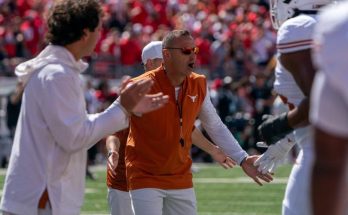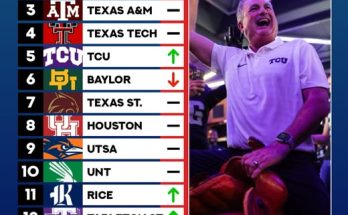Jackson Arnold’s journey to becoming the Auburn Tigers’ new quarterback is one defined by trials, growth, and quiet resilience. For those who followed his career from high school to his time with the Oklahoma Sooners, it was clear early on that Arnold had all the makings of a star: a cannon of an arm, quick feet, and a football IQ far beyond his years. But as many young athletes quickly discover, talent alone doesn’t guarantee smooth sailing in college football—especially at a program with the prestige and pressure of Oklahoma. Now, as Arnold steps into a new chapter at Auburn, he does so with a hard-earned maturity that only comes from enduring the highs and lows that college football throws at its young stars.
Coming out of high school, Jackson Arnold was the golden boy. Rated as one of the top dual-threat quarterbacks in the nation, he had recruiters from coast to coast vying for his commitment. A native of Denton, Texas, Arnold was dominant at Guyer High School, putting up staggering numbers and showcasing a level of poise rarely seen in teenage quarterbacks. His mechanics were clean, his timing was sharp, and he demonstrated an uncanny ability to read defenses. When he ultimately chose Oklahoma, it was hailed as a major recruiting win for the Sooners, who were transitioning into the Brent Venables era and looking to restock their quarterback room with elite talent.
Arnold’s arrival at Oklahoma was met with anticipation and fanfare. The Sooners had just finished a rocky 6-7 season, their worst in decades, and the fan base was hungry for a fresh face to inject some life into the program. Arnold was seen as a potential savior—not immediately, but soon. At the time, Dillon Gabriel was the starting quarterback, a veteran with years of experience under his belt. The expectation was that Arnold would sit, learn, and gradually work his way into the starting role. And for a while, that plan seemed to hold.
But college football, like life, rarely goes according to script. Arnold’s freshman year was a mix of promise and frustration. He got limited reps in garbage time, and while he flashed potential, the bulk of his learning happened off the field. He absorbed playbooks, studied film, and worked closely with the coaching staff to refine his understanding of the offense. Still, the burning desire to compete, to lead, never left him. Those who watched him in practice spoke glowingly of his work ethic and willingness to improve. He didn’t complain. He didn’t sulk. He put his head down and grinded.
Then came year two—the season many believed would be his breakout. Gabriel, though consistent, had struggled in big games. The murmurs among the fan base grew louder: it was time to hand the keys to Arnold. That pressure crescendoed after a midseason stretch of lackluster offensive performances. Calls for Arnold to start intensified, and soon, those murmurs turned into full-blown demands. When Arnold finally got his shot late in the season, it was in the middle of a chaotic stretch for the team. The offensive line was banged up. Receivers were dropping passes. The defense couldn’t stay off the field. And Arnold, the young quarterback thrust into a pressure cooker, struggled to find his rhythm.
His first few starts were uneven. At times, he looked every bit the five-star recruit—slipping out of sacks, delivering strikes into tight windows, and showing composure under duress. But those flashes were often followed by costly interceptions, miscommunications with receivers, and rookie mistakes. The Oklahoma fan base, so eager to anoint him as the next big thing, turned impatient. Criticism poured in from all angles: social media, sports radio, even message boards. Every errant throw was dissected. Every decision questioned. For a young quarterback, it could have been soul-crushing.
But Jackson Arnold didn’t break.
If anything, that difficult stretch became a crucible for his development. Instead of blaming coaches, teammates, or circumstances, he looked inward. He dove even deeper into film study, worked with trainers on his footwork, and leaned on mentors both inside and outside the program. It wasn’t easy. Confidence, once natural and effortless, had to be rebuilt. But Arnold discovered something powerful in that process: humility. And more importantly, resilience.
He also learned about leadership—not the kind that comes from scoring touchdowns or delivering fiery locker room speeches, but the kind forged in silence, in late-night workouts and private conversations with teammates. He learned that being a quarterback isn’t just about Xs and Os; it’s about earning trust, setting a tone, and handling adversity with grace.
When the season ended and Oklahoma began making offseason evaluations, Arnold took time to reflect on his role within the program. There were whispers of competition in the quarterback room, and even louder whispers about the Sooners exploring the transfer portal. It was clear the coaching staff wasn’t fully committed to him as the future. For Arnold, it was a moment of reckoning. He loved Oklahoma, but he also knew that he needed a fresh start—somewhere he could apply the hard lessons learned and lead a program that believed in him.
That somewhere turned out to be Auburn.
When news broke that Jackson Arnold was transferring to the Auburn Tigers, it sent shockwaves through the college football landscape. Auburn, under head coach Hugh Freeze, had been aggressively rebuilding its roster and was in search of a quarterback who could be the face of the program. For Freeze, Arnold wasn’t just a talented player—he was a competitor who had already been through the fire.
At Auburn, Arnold found a different energy. The SEC is a beast unto itself—relentless, unforgiving, but also the pinnacle of college football competition. For Arnold, the move wasn’t about taking the easy path. It was about growth, challenge, and proving to himself that the setbacks at Oklahoma weren’t the end of his story but merely a chapter.
In his early days at Auburn, Arnold made an immediate impression. Players noted how quickly he adapted to the new playbook. Coaches praised his decision-making and attention to detail. But what stood out the most was his attitude. He wasn’t entitled. He wasn’t trying to act like a savior. He carried himself like a young man who had been humbled—and strengthened—by adversity.
Off the field, Arnold took on a leadership role without being asked. He organized player-led workouts, spent extra hours with receivers to build timing, and made it a point to connect with linemen, defensive players, and special teamers alike. He understood the importance of team chemistry and was determined to earn respect the right way.
On the field, his mechanics looked sharper. His timing was better. He showed improved pocket presence and a willingness to take what the defense gave him instead of forcing throws. But perhaps the biggest change was mental. Arnold no longer played with the fear of making mistakes. Instead, he played with clarity and purpose, trusting his preparation and experience.
As Auburn’s spring camp wrapped up and the depth chart took shape, it became clear that Arnold was in the driver’s seat to start. But even as excitement grew around him, Arnold remained grounded. When asked about his struggles at Oklahoma, he didn’t dodge the topic. Instead, he spoke openly about how those experiences shaped him—not just as a quarterback but as a person. He acknowledged the pain, the frustration, and even the doubts. But he also emphasized how much he learned—about football, about leadership, and about himself.
It’s a rare kind of honesty in an era where athletes are often media-trained into clichés. But that’s what makes Arnold’s story resonate. It’s not just about a talented quarterback changing schools. It’s about resilience, self-awareness, and the ability to grow through discomfort. In many ways, Jackson Arnold’s path mirrors that of many young people navigating life: full of expectation, sometimes falling short, but ultimately rising stronger because of it.
As the new season approaches, there’s a cautious optimism surrounding Auburn’s offense. Arnold will have weapons around him, a solid run game, and a coaching staff that believes in his potential. But more importantly, he brings with him something no amount of hype or star rankings can guarantee: hard-earned experience.
That experience—painful as it was—has forged in Arnold a deeper understanding of what it takes to succeed at this level. Not just talent, but consistency. Not just ambition, but preparation. Not just swagger, but substance.
Fans may look at Arnold and see the highlight reels or the stat sheets. But those who truly understand football—and growth—see a young man who refused to let adversity define him. Who learned to lead not by shouting but by listening. Who embraced the grind even when the spotlight dimmed.
In that sense, Jackson Arnold is not just Auburn’s quarterback of the future. He’s a living testament to the power of perseverance. His story reminds us that greatness is rarely born from comfort. It’s carved out in the shadows, in the losses, and in the quiet decision to keep going when everything says to stop.
Only time will tell how successful Arnold will be in his new home. The SEC is unforgiving, and the pressure to perform will be immense. But one thing is clear: Jackson Arnold arrives at Auburn not as a prodigy, but as a man shaped by the game he loves—ready, tested, and hungry to write his next chapter.



